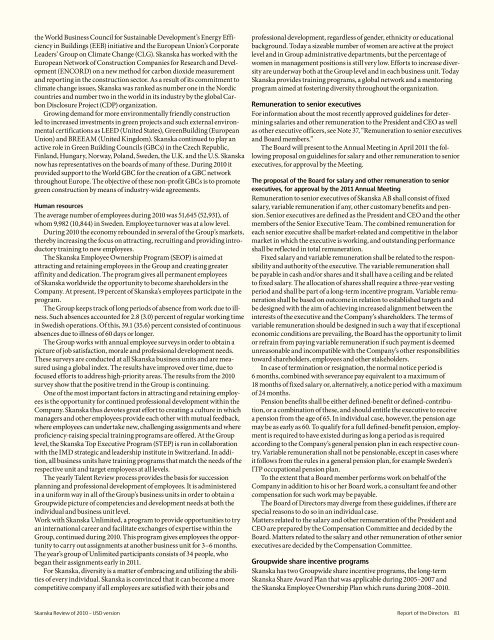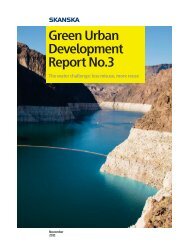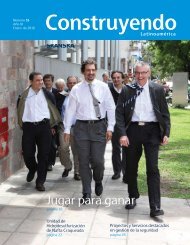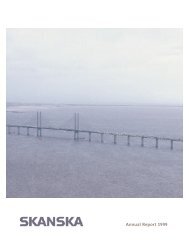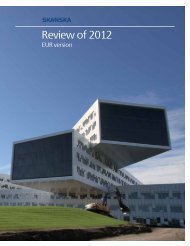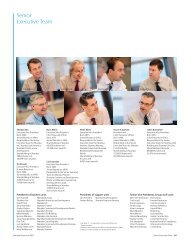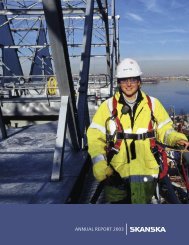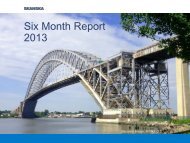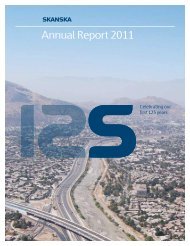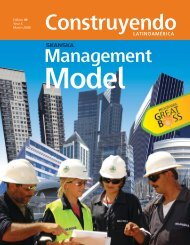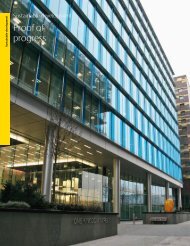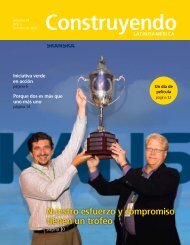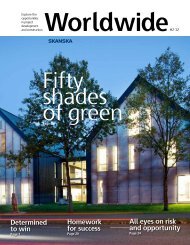Review of 2010 â USD version - Skanska
Review of 2010 â USD version - Skanska
Review of 2010 â USD version - Skanska
Create successful ePaper yourself
Turn your PDF publications into a flip-book with our unique Google optimized e-Paper software.
the World Business Council for Sustainable Development’s Energy Efficiency<br />
in Buildings (EEB) initiative and the European Union’s Corporate<br />
Leaders’ Group on Climate Change (CLG). <strong>Skanska</strong> has worked with the<br />
European Network <strong>of</strong> Construction Companies for Research and Development<br />
(ENCORD) on a new method for carbon dioxide measurement<br />
and reporting in the construction sector. As a result <strong>of</strong> its commitment to<br />
climate change issues, <strong>Skanska</strong> was ranked as number one in the Nordic<br />
countries and number two in the world in its industry by the global Carbon<br />
Disclosure Project (CDP) organization.<br />
Growing demand for more environmentally friendly construction<br />
led to increased investments in green projects and such external environmental<br />
certifications as LEED (United States), GreenBuilding (European<br />
Union) and BREEAM (United Kingdom). <strong>Skanska</strong> continued to play an<br />
active role in Green Building Councils (GBCs) in the Czech Republic,<br />
Finland, Hungary, Norway, Poland, Sweden, the U.K. and the U.S. <strong>Skanska</strong><br />
now has representatives on the boards <strong>of</strong> many <strong>of</strong> these. During <strong>2010</strong> it<br />
provided support to the World GBC for the creation <strong>of</strong> a GBC network<br />
throughout Europe. The objective <strong>of</strong> these non-pr<strong>of</strong>it GBCs is to promote<br />
green construction by means <strong>of</strong> industry-wide agreements.<br />
Human resources<br />
The average number <strong>of</strong> employees during <strong>2010</strong> was 51,645 (52,931), <strong>of</strong><br />
whom 9,982 (10,844) in Sweden. Employee turnover was at a low level.<br />
During <strong>2010</strong> the economy rebounded in several <strong>of</strong> the Group’s markets,<br />
thereby increasing the focus on attracting, recruiting and providing introductory<br />
training to new employees.<br />
The <strong>Skanska</strong> Employee Ownership Program (SEOP) is aimed at<br />
attracting and retaining employees in the Group and creating greater<br />
affinity and dedication. The program gives all permanent employees<br />
<strong>of</strong> <strong>Skanska</strong> worldwide the opportunity to become shareholders in the<br />
Company. At present, 19 percent <strong>of</strong> <strong>Skanska</strong>’s employees participate in the<br />
program.<br />
The Group keeps track <strong>of</strong> long periods <strong>of</strong> absence from work due to illness.<br />
Such absences accounted for 2.8 (3.0) percent <strong>of</strong> regular working time<br />
in Swedish operations. Of this, 39.1 (35.6) percent consisted <strong>of</strong> continuous<br />
absences due to illness <strong>of</strong> 60 days or longer.<br />
The Group works with annual employee surveys in order to obtain a<br />
picture <strong>of</strong> job satisfaction, morale and pr<strong>of</strong>essional development needs.<br />
These surveys are conducted at all <strong>Skanska</strong> business units and are measured<br />
using a global index. The results have improved over time, due to<br />
focused efforts to address high-priority areas. The results from the <strong>2010</strong><br />
survey show that the positive trend in the Group is continuing.<br />
One <strong>of</strong> the most important factors in attracting and retaining employees<br />
is the opportunity for continued pr<strong>of</strong>essional development within the<br />
Company. <strong>Skanska</strong> thus devotes great effort to creating a culture in which<br />
managers and other employees provide each other with mutual feedback,<br />
where employees can undertake new, challenging assignments and where<br />
pr<strong>of</strong>iciency-raising special training programs are <strong>of</strong>fered. At the Group<br />
level, the <strong>Skanska</strong> Top Executive Program (STEP) is run in collaboration<br />
with the IMD strategic and leadership institute in Switzerland. In addition,<br />
all business units have training programs that match the needs <strong>of</strong> the<br />
respective unit and target employees at all levels.<br />
The yearly Talent <strong>Review</strong> process provides the basis for succession<br />
planning and pr<strong>of</strong>essional development <strong>of</strong> employees. It is administered<br />
in a uniform way in all <strong>of</strong> the Group’s business units in order to obtain a<br />
Groupwide picture <strong>of</strong> competencies and development needs at both the<br />
individual and business unit level.<br />
Work with <strong>Skanska</strong> Unlimited, a program to provide opportunities to try<br />
an international career and facilitate exchanges <strong>of</strong> expertise within the<br />
Group, continued during <strong>2010</strong>. This program gives employees the opportunity<br />
to carry out assignments at another business unit for 3–6 months.<br />
The year’s group <strong>of</strong> Unlimited participants consists <strong>of</strong> 34 people, who<br />
began their assignments early in 2011.<br />
For <strong>Skanska</strong>, diversity is a matter <strong>of</strong> embracing and utilizing the abilities<br />
<strong>of</strong> every individual. <strong>Skanska</strong> is convinced that it can become a more<br />
competitive company if all employees are satisfied with their jobs and<br />
pr<strong>of</strong>essional development, regardless <strong>of</strong> gender, ethnicity or educational<br />
background. Today a sizeable number <strong>of</strong> women are active at the project<br />
level and in Group administrative departments, but the percentage <strong>of</strong><br />
women in management positions is still very low. Efforts to increase diversity<br />
are underway both at the Group level and in each business unit. Today<br />
<strong>Skanska</strong> provides training programs, a global network and a mentoring<br />
program aimed at fostering diversity throughout the organization.<br />
Remuneration to senior executives<br />
For information about the most recently approved guidelines for determining<br />
salaries and other remuneration to the President and CEO as well<br />
as other executive <strong>of</strong>ficers, see Note 37, “Remuneration to senior executives<br />
and Board members.”<br />
The Board will present to the Annual Meeting in April 2011 the following<br />
proposal on guidelines for salary and other remuneration to senior<br />
executives, for approval by the Meeting.<br />
The proposal <strong>of</strong> the Board for salary and other remuneration to senior<br />
executives, for approval by the 2011 Annual Meeting<br />
Remuneration to senior executives <strong>of</strong> <strong>Skanska</strong> AB shall consist <strong>of</strong> fixed<br />
salary, variable remuneration if any, other customary benefits and pension.<br />
Senior executives are defined as the President and CEO and the other<br />
members <strong>of</strong> the Senior Executive Team. The combined remuneration for<br />
each senior executive shall be market-related and competitive in the labor<br />
market in which the executive is working, and outstanding performance<br />
shall be reflected in total remuneration.<br />
Fixed salary and variable remuneration shall be related to the responsibility<br />
and authority <strong>of</strong> the executive. The variable remuneration shall<br />
be payable in cash and/or shares and it shall have a ceiling and be related<br />
to fixed salary. The allocation <strong>of</strong> shares shall require a three-year vesting<br />
period and shall be part <strong>of</strong> a long-term incentive program. Variable remuneration<br />
shall be based on outcome in relation to established targets and<br />
be designed with the aim <strong>of</strong> achieving increased alignment between the<br />
interests <strong>of</strong> the executive and the Company’s shareholders. The terms <strong>of</strong><br />
variable remuneration should be designed in such a way that if exceptional<br />
economic conditions are prevailing, the Board has the opportunity to limit<br />
or refrain from paying variable remuneration if such payment is deemed<br />
unreasonable and incompatible with the Company’s other responsibilities<br />
toward shareholders, employees and other stakeholders.<br />
In case <strong>of</strong> termination or resignation, the normal notice period is<br />
6 months, combined with severance pay equivalent to a maximum <strong>of</strong><br />
18 months <strong>of</strong> fixed salary or, alternatively, a notice period with a maximum<br />
<strong>of</strong> 24 months.<br />
Pension benefits shall be either defined-benefit or defined-contribution,<br />
or a combination <strong>of</strong> these, and should entitle the executive to receive<br />
a pension from the age <strong>of</strong> 65. In individual case, however, the pension age<br />
may be as early as 60. To qualify for a full defined-benefit pension, employment<br />
is required to have existed during as long a period as is required<br />
according to the Company’s general pension plan in each respective country.<br />
Variable remuneration shall not be pensionable, except in cases where<br />
it follows from the rules in a general pension plan, for example Sweden’s<br />
ITP occupational pension plan.<br />
To the extent that a Board member performs work on behalf <strong>of</strong> the<br />
Company in addition to his or her Board work, a consultant fee and other<br />
compensation for such work may be payable.<br />
The Board <strong>of</strong> Directors may diverge from these guidelines, if there are<br />
special reasons to do so in an individual case.<br />
Matters related to the salary and other remuneration <strong>of</strong> the President and<br />
CEO are prepared by the Compensation Committee and decided by the<br />
Board. Matters related to the salary and other remuneration <strong>of</strong> other senior<br />
executives are decided by the Compensation Committee.<br />
Groupwide share incentive programs<br />
<strong>Skanska</strong> has two Groupwide share incentive programs, the long-term<br />
<strong>Skanska</strong> Share Award Plan that was applicable during 2005–2007 and<br />
the <strong>Skanska</strong> Employee Ownership Plan which runs during 2008–<strong>2010</strong>.<br />
<strong>Skanska</strong> <strong>Review</strong> <strong>of</strong> <strong>2010</strong> – <strong>USD</strong> <strong>version</strong> Report <strong>of</strong> the Directors 81


